| |

|
DeLoG NEWSLETTER
No. 56 – 08/2021
|
|

|
| |
|
|
| |
Dear Reader,
welcome to issue No. 56 of the DeLoG Newsletter which showcases the Network’s most recent activities and offers an overview of current news as well as upcoming events and courses.
In this issue, we introduce you to the DeLoG Annual Meeting 2021, that will be held in September under the theme “Inclusive and Resilient Decentralisation and Local Governance Support”. The event will bring members and partners together, from policy-making to implementation level, for six sessions of reflection and exchange on measuring, enabling, mobilising and adapting inclusion and resilience for sustainable Decentralisation and Local Governance (DLG) support.
The Annual Meeting 2021 will also be the occasion to start implementing the Strategy 2021-2024, which was recently launched during a DeLoG in Dialogue event. You can learn more about this event, the AM and the Strategy in our section on DeLoG Activities.
We hope you enjoy this issue and encourage you to forward our Newsletter to others interested in staying updated on Decentralisation and Local Governance.
All the best and stay healthy!
Your DeLoG Team
Contact: [email protected] |
|
|
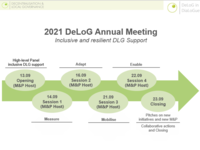
© DeLoG
|
|
DeLoG Annual Meeting 2021: Informing, Enabling, Mobilising, Adapting for Inclusive and Resilient Decentralisation and Local Governance
Local governments are key to solving crises, taking the impact of shocks and protecting citizens. However, they face various challenges in carrying out their action, reaching from crisis response to service delivery to building sustainable development. Against the backdrop of the United Nations 2030 Agenda and its Sustainable Development Goals (SDGs), the commitments to ‘’Leave No One Behind’’ and to ‘’promote peaceful and inclusive societies for sustainable development, provide access to justice for all and build effective, accountable and inclusive institutions at all levels’’ (SDG 16), DeLoG members and partners will convene in September 2021 for an Annual Meeting (AM) on how to build inclusive and resilient DLG support.
|
| |
|
|
| |
|
|
|
|
|
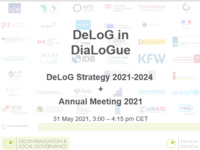
© DeLoG
|
|
Second ''DeLoG in Dialogue'' Event to Present the DeLoG Strategy 2021-2024 and Inclusively Plan the Annual Meeting 2021
On 31 May 2021 the DeLoG secretariat and the Strategic Support Group invited members and partners to the second DeLoG in Dialogue (D'n'D). The second D’n’D session gathered 26 participants from diverse DeLoG members and partners. Its aim was to ensure a transparent and collaborative discussion on the development of the DeLoG strategy 2021-2024 and the organisation of the Annual Meeting 2021. These two processes were elaborated during 2020 through a series of consultations to respond to the challenges that DeLoG is facing due to rapidly changing circumstances in DLG support policies and action. The upcoming Annual Meeting will further ensure the adoption and implementation of the strategy based on partnership and a common vision of DLG support.
|
| |
|
|
| |
|
|
|
|
|
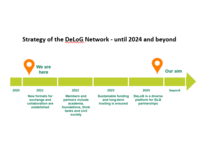
© DeLoG
|
|
Launch of the DeLoG Strategy 2021-2024
Launched during the second D'n'D, the new DeLoG Strategy 2021-2024 paves the way for developing the network towards a strong global partnership for “Effective Decentralisation and Local Governance Support”. Throughout 2020 and 2021, the DeLoG Secretariat and the Strategic Support Group (SSG) conducted a consultation process to get a common understanding of the networks added value for members and partners and a clear vision of its future objectives.
During this process, scenarios for the sustainable future of the network were identified, including five strategic areas for potential development until 2024 and beyond.
|
| |
|
|
| |
|
|
|
|
|
News from our Members and Partners
|
|
|
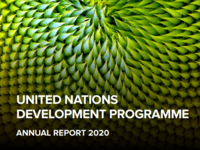
© UNDP
|
|
UNDP Annual Report 2020: Fighting the Pandemic from Micro to Macro
As the agency responsible for working on global, national and local development challenges and solutions, UNDP has had to adapt rapidly to the new challenges posed by the COVID-19 pandemic. To keep serving its mandate, the agency managed to go fully digital just six days after the global emergency was declared. Not only did the organisation manage to adapt its programming and activities during the crisis, it also intensively worked on recovery and post-recovery measures, taking the long-term vision until 2030 and insisting on the importance of building integrated strategies and action. The agency worked intensively with subnational governments and through community-based approaches, while highlighting the crucial role of the SDGs as a key framework for inclusive and resilient change.
|
| |
|
|
| |
|
|
|
|
|
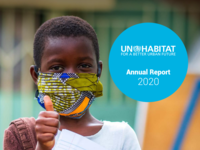
© Shutterstock / Yaw Niel
|
|
UN-Habitat Annual Report 2020: Adapting Urban Development to Rapid Changes
The 2020 UN-Habitat Annual Report elaborates on progress and impacts made by the UN agency in four change domains: alleviating poverty and inequality, enhancing shared prosperity, strengthening climate action and preventing urban crisis. To implement activities supporting sustainable urban development, UN-Habitat used data, knowledge, good practices and innovative solutions. While the year of the COVID-19 pandemic disrupted some activities, it also provided the opportunity to work on building adaptable and resilient programming to respond to the crisis in urban areas. Other major achievements were made in setting the global discourse on sustainable urbanisation, supporting vulnerable populations in urban settings and establishing new partnerships.
|
| |
|
|
| |
|
|
|
|
|
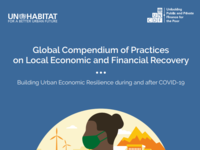
© UN-Habitat
|
|
UN-Habitat Publishes a Global Compendium of Practices on Local Economic and Financial Recovery
The COVID-19 pandemic has had significant effects on cities around the globe. Measures and restrictions put in place at national and local level resulted in a decline in economic activities and high revenue losses for local governments. Recovery is not only key to allow this trend to be reversed but also to “build back better” more sustainably. Guided by UN-Habitat and UNCDF, the project to compile a compendium of practices to support local governments in recovering, planning and building resilient cities takes a multi-hazard, multi-sectoral and multi-stakeholder approach. The compendium also includes case studies and lessons from cities based on the conceptual framework on urban economic resilience. As key characteristics of resilient cities it includes effective, inclusive, and participatory governance, partnerships with central and regional governments, reliable service delivery, robust public financial management system and close engagement with the private sector.
|
| |
|
|
| |
|
|
|
|
|
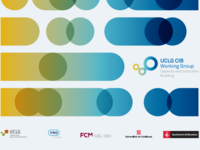
© Jasa Gabrijan
|
|
UCLG CIB Working Group Launches a Publication on Capacity Building for Gender Equality at the Local Level
Based on SDG 5 for “achieving gender equality and empowering all women and girls” and SDG 10 for the reduction of "inequality within and among countries”, the UCLG Capacity and Institution Building (CIB) Working Group published a new report on the importance of integrating the gender perspective in designing and implementing international development projects and programs. The publication aims at offering a vision of the role of gender mainstreaming in the action of the UCLG membership as well as the relevance they attribute to capacity building for advancing gender equality, the empowerment of women, and women in local leadership. The CIB Working Group also focuses on the importance of localising gender action.
|
| |
|
|
| |
|
|
|
|
|
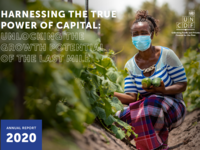
© UNCDF Mozambique / Mbuto Machili
|
|
UNCDF Annual Report 2020 on Leaving No One Behind Through Harnessing Capital
The COVID-19 crisis exacerbated already existing vulnerabilities of the Least Developed Countries (LDCs). It also clearly showed that the current development finance structure does not allow to shield the most vulnerable populations, women, youth and smallholder farmers, and that more inclusion is urgently needed.
In its annual report, UNCDF explains its efforts to help build inclusive digital finance systems in response to the health and economic challenges, by focusing on innovating approaches and inclusion of marginalised communities and vulnerable populations. In 2020, UNCDF provided financial and digital solutions to face current challenges and focused on decentralised financing mechanisms in 39 LDCs. UNCDF highlights that the task ahead is to harness the true power of capital to support inclusive and resilient development to leave no one behind
|
| |
|
|
| |
|
|
|
|
|
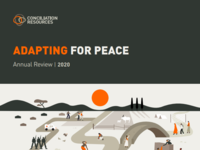
© Tyla Mason / Emma Philip
|
|
Conciliation Resources Annual Review 2020: A Strategy on Adapting and Connecting for Peace
The number of conflicts in the past ten years has been rising exponentially, increasing the number of people in need of humanitarian assistance and forcing people to migrate. In many regions of the world, peace is a difficult goal to reach. In 2020, the COVID-19 pandemic further exposed and worsened fragilities, also highlighting inequalities globally and locally. Conciliation Resources' work in the past year consisted of supporting peacebuilding through working on adaptability and resilience. One of the important mechanisms that the organisation aims at implementing is to connect people's needs and views locally to national and global political processes.
The report highlights the activities of the organisation in several African and Asian regions in 2020, including creating civic and political space and supporting youth and women peacebuilders
|
| |
|
|
| |
|
|
|
|
|
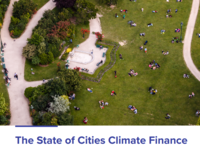
© Cities Climate Finance Leadership Alliance
|
|
Cities Climate Finance Leadership Alliance Publishes the 2021 State of Cities Climate Finance
Cities are central to facing climate challenges, in reducing greenhouse gas emissions and climate risks, which can also create jobs across the globe and generate high gains for economies. However, cities, especially in developing countries, still face high barriers to financing climate action. The COVID-19 pandemic further added obstacles and challenges, making cities rely on inadequate financial instruments and forcing some to reduce climate action. While the investment in climate finance at local level is increasing, it is still insufficient, especially in countries where urban growth is faster.
Against this backdrop, on 30 June 2021 the Cities Climate Finance Leadership Alliance launched the 2021 State of Cities Climate Finance Report. The report presents a comprehensive view of global urban climate finance, including sources and destinations, frameworks, tools and solutions to mobilise climate finance. It calls for a systemic and whole of economy approach, whereby country, city and climate policies, data and activities are aligned, well-funded and executed at the local level.
|
| |
|
|
| |
|
|
|
|
|
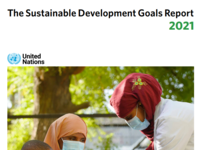
© UNICEF Ethiopia / Tewodros Tadesse
|
|
The Sustainable Development Goals Report 2021 Highlights Sustainability, Inclusion and Resilience as Key to Recovery
The COVID-19 pandemic has had catastrophic effects on the world’s population, beyond its health implications. Support for the 2030 Agenda for Sustainable Development and the SDGs is more crucial than ever, as the pandemic has stalled and reversed many positive processes of change. Inequalities and poverty are rising exponentially, the health systems in many regions of the world have completely collapsed, and protecting and ensuring inclusion and equality for children, women and older people is more challenging than ever. However, the crisis holds the potential to create necessary social, political and economic change to build strategies and action towards sustainability, resilience and inclusion. Conducted by the United Nations Department of Economic and Social Affairs in collaboration with more than 50 international agencies, the Sustainable Development Goals Report 2021 uses data and estimates to calculate the impacts of the pandemic and the ensuing crisis on the areas concerning the SDGs. It places each SDG in the context of the crisis and gives a comprehensive vision of the challenges ahead.
|
| |
|
|
| |
|
|
|
|
|
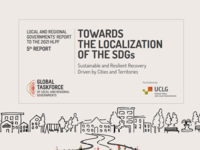
© UCLG
|
|
For Localising the SDGs, UCLG GOLD Proposes Boosting Monitoring & Reporting
UCLG's Global Observatory on Local Democracy and Decentralization (GOLD) intensively works on supporting the localisation of the SDGs, the 2030 Agenda and other global agendas. It coordinates and guides the process of Voluntary Subnational Reviews and Voluntary Local Reviews and presented the report on progress in localisation at the High-Level Political Forum 2021 earlier this month. GOLD puts an accent on the processes of monitoring and reporting by subnational and local governments. The fifth report on SDGs localisation goes through several processes, including a proposed methodology and policy to enable an environment for localisation. It also reports on local and regional governments' contributions to facing the COVID-19 pandemic and building recovery as well as analysing the financing and monitoring of localisation. The report focuses particularly on the 43 countries presenting Voluntary National Reviews in 2021.
|
| |
|
|
| |
|
|
|
|
|
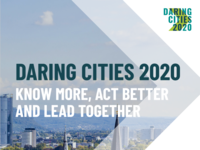
© ICLEI
|
|
ICLEI Publishes Daring Cities 2020 Conference Report
With more than 850 cities and regions from six continents, Daring Cities is the largest gathering of local governments working together on facing climate change. The 2020 report highlights the outcomes of the first Daring Cities conference. The conference aims to empower local leaders to act on climate change, offering a platform to discuss and exchange challenges and opportunities in adaptation and mitigation. The COVID-19 pandemic prompted a postponement of the climate agendas to face the crisis. Therefore, Daring Cities provided a platform where stakeholders facing the climate emergency together could discuss innovations and ideas for new resources to fight climate change. The conference had three outcomes: First, nearly 1000 cities have already committed and are on track to reach ambitious climate goals, second, unique daring approaches drive momentum to respond to the climate emergency, and third, local and regional governments need a platform like Daring Cities to better address climate change through local action.
|
| |
|
|
| |
|
|
|
|
|
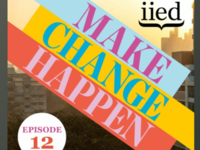
© IIED
|
|
New Episode of IIED's Make Change Happen Podcast
How has COVID-19 been affecting circumstances in low-income urban communities in the global South? The new episode of IIED’s “Make Change Happen” podcast explores the urban dimensions of the pandemic and its impacts on vulnerable communities in urban areas, who have been disproportionately affected. In the episode, researchers and practitioners from various organisations highlight and discuss several city- and community-led responses to the crisis. The guests share their experience in working with urban communities on recovery, in how to achieve green recovery and the importance of taking an inclusive approach across all levels of governance.
|
| |
|
|
| |
|
|
|
|
|
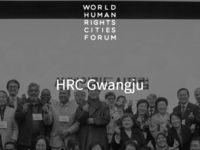
© HRC
|
|
11th World Human Rights Cities Forum
When: 7 October 2021 - 10 October 2021
Where: Gwangju, Korea / Online
Apply by: No registration needed
Cities are key players in promoting and protecting human rights. The Gwangju Declaration on Human Rights Cities, adopted during the first World Human Rights Cities Forum, defines human rights cities as “both a local community and a socio‐political process in a local context, where human rights play a key role as the fundamental values and guiding principles”. Human rights cities stress the importance of inter-local and international cooperation among cities engaged in the promotion and protection of human rights,. In addition, securing broad participation from all actors and interest groups, in particular socially marginalised and vulnerable groups, and effective and independent human rights protection and management systems are key. The topic of the 11th World Human Rights Cities Forum will be: "Human Rights in Times of Challenge: A New Social Contract".
|
| |
|
|
| |
|
|
|
|
|
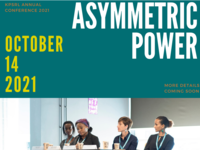
© KPSRL
|
|
KPSRL Annual Conference 2021
When: 14 October 2021, 09:00 am - 19:00 pm CET
Where: Online
Apply by: Registration open
While the peace and development sector has long been preoccupied with inequality and injustice in societies, pressure has been mounting to address unequal power distribution within the sector itself. The Knowledge Platform Security & Rule of Law (KPSRL) community has become increasingly vocal about seizing this moment of upheaval to redress asymmetric power structures. Power structures run from global institutions right down through local groups.
With respect to the local level, the 2021 KPAC will address how donors can create space for innovative and effective locally-driven initiatives and how they can support those promoting peace and security in their communities.
|
| |
|
|
| |
|
|
|
|
|
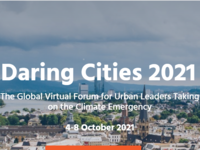
© ICLEI
|
|
Daring Cities 2021
When: 4 October 2021 - 8 October 2021
Where: Online
Apply by: Registration open
Daring Cities is a virtual, global forum on climate change for urban leaders tackling the climate emergency, especially in the context of the COVID-19 pandemic. Its first convening took place in 2020 and was initiated by ICLEI and the Federal City of Bonn.
Daring Cities 2021 will build upon the success of 2020’s conference, which was the largest online gathering of the urban community on the climate emergency to date. Over 4500 attendees engaged in Daring Cities 2020 over the course of the three-week virtual forum, which featured around 100 virtual offerings and 500 speakers, including the UN Secretary General, eight Ministers, seven UN Agency chiefs, and more than 150 Mayors, Governors, Councilors and other urban leaders. The second forum will further explore the effects of the pandemic on climate action and needs as well as solutions for tackling climate change at local level.
|
| |
|
|
| |
|
|
|
|
|
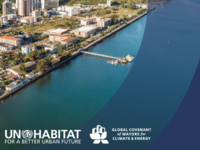
© Global Covenant of Mayors for Climate and Energy
|
|
Innovate4Cities 2021
When: 11 October 2021 - 15 October 2021
Where: Online
Apply by: Registration open
Innovate4Cities is a research and innovation initiative by UN-Habitat and the Global Covenant of Mayors for Climate and Energy (GCoM) that aims to answer the most pressing questions cities and local governments face when evaluating why and how to take climate action. The initiative defines and addresses cities’ knowledge and innovation opportunities, and creates partnerships between the scientific and academic community, businesses, and governments to overcome the challenges local governments face between their publicly reported ambition and full-scale implementation. The conference will combine science and innovation with policy and practice to support cities in taking more ambitious climate action in order to reduce their carbon footprint and increase resilience to climate change.
|
| |
|
|
| |
|
|
|
|
|
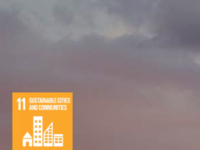
© SDG Academy
|
|
Cities and the Challenge of Sustainable Development
When: Self-Paced - Complete before 31 August 2021
Where: Online
Apply by: Registration open
|
| |
|
|
| |
|
|
|
|
|
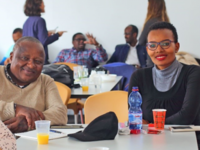
© The Hague Academy for Local Governance
|
|
Fiscal Decentralisation and Local Finance
When: 7 February 2022 - 18 February 2022
Where: The Hague
Apply by: 31 December 2021
|
| |
|
|
| |
|
|
|
|
|
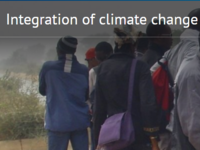
© UNCCLEARN
|
|
Integration of Climate Change Into National, Sectoral and Local Policies
When: Self-Paced
Where: Online
Apply by: Registration open
|
| |
|
|
| |
|
|
|
|
|
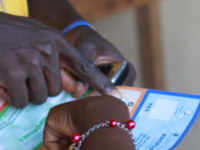
© Swiss Peace
|
|
Peacebuilding & Institutional Reform
When: 4 October 2021 - 13 October 2021
Where: Online
Apply by: 31 August 2021
|
| |
|
|
| |
|
|
|
|
|
Knowledge
|
|
|
Fragility ● Post-conflict Settings ● Migration
|
|
|
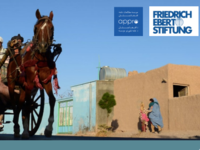
© Mohammed Aref Karimi
|
|
Local Dynamics of Conflict and Peace in Afghanistan
The series of six briefs analyses dynamics of conflict and conditions for peace in different regions in Afghanistan, namely Central, Western, Southern, North-East, Northern and Eastern Afghanistan. The briefs were produced in the context of the joint project Reaching Out For Peace by Friedrich-Ebert-Stiftung (FES), Afghanistan Public Policy Research Organisation (APPRO) and Mediothek Afghanistan for Development and Peace Organisation (MADPO). The three organisations want to engage Afghan citizens at the local level to identify the challenges for peace in open dialogues. The briefs are part of the outcomes of the project, aiming at reflecting ideas and perspectives of citizens concerning the needs for inclusive peace processes that can create long-term stability in Afghanistan.
Author: Lucile Martin, Saeed Parto, Martha Le Grand
Publisher: Friedrich-Ebert-Stiftung Afghanistan
Publication Date: 2021
Copyright: Friedrich-Ebert-Stiftung Afghanistan
|
| |
|
|
| |
|
|
|
|
|
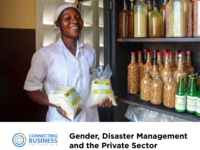
© UNDP Benin
|
|
Gender, Disaster Management and the Private Sector
The report published by UNDP and OCHA provides a detailed overview of the importance of gender in the private sector and disaster preparedness, response and recovery. Development, humanitarian and private sector actors have been increasing gender mainstreaming in their planning and implementation processes. However, often, the gender dimension is not considered at the intersection of disaster management and the private sector. Developed to give an input to the Connecting Business initiative (CBi), the report's aim is to support engaging the private sector in disaster management through localised, collective and anticipatory action. The report gives a thematic overview of gender and disaster management, focusing particularly on private sector disaster management, examines gender mapping and analysis in disaster management and finally presents some case studies. A dedicated chapter on COVID-19 explains the impact of the pandemic on the discussed topics.
Author: Maria Kontro
Publisher: UNDP, OCHA
Publication Date: 2021
Copyright: UNDP, OCHA
|
| |
|
|
| |
|
|
|
|
|
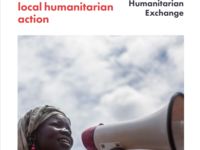
© OXFAM GB
|
|
Localisation and Local Humanitarian Action
The Humanitarian Practice Network (HPN) at ODI is an independent forum where field workers, managers and policymakers in the humanitarian sector share information, analysis and experience. The 79th number of HPN’s Humanitarian Exchange magazine focuses on localisation and local humanitarian action. In 2016, the establishment of the Grand Bargain Agreement aimed at ensuring that local actors' capacities to address crises are expanded. However, progress in localising aid is slow. The articles in this edition specifically discuss the link between capacity strengthening and localisation. Capacity-building for localisation is analysed in various contexts and regions, in its multi-level governance aspect and through the lens of innovative, more long-term approaches. Moreover, this publication elaborates on the collaboration between international actors and local organisations aiming to support locally-led response and recovery from COVID-19 and similar crises.
Publisher: Humanitarian Practice Network (HPN), ODI
Publication Date: 2021
Copyright: Humanitarian Practice Network (HPN), ODI
|
| |
|
|
| |
|
|
|
|
|
Fiscal Decentralisation ● Local Finance
|
|
|
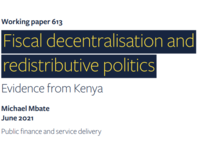
© ODI
|
|
Fiscal Decentralisation and Redistributive Politics: Evidence from Kenya
This working paper by Michael Mbate provides insights on how party politics shape decision-makers’ incentives to compare each other’s performance across neighboring localities in the specific case of Kenya. The fiscal decentralization efforts and the public spending across local counties in Kenya through a partisan reform that increased spending in ten of Kenya’s 47 counties is examined. Drawing on household survey and further evidence, this study shows that policy-makers in the abutting counties that bordered the ten reform counties engaged in ‘’free riding’’, meaning that they reduced spending on their own public goods and services because they relied on citizens accessing services in neighboring counties.
Author: Michael Mbate
Publisher: ODI
Publication Date: 2021
Copyright: ODI
|
| |
|
|
| |
|
|
|
|
|
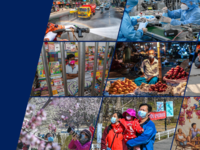
© ADB
|
|
ADB COVID-19 Policy Database
The ADB COVID-19 Policy Database displays the measures taken and monetary amounts announced or estimated by the 68 members of the Asian Development Bank, two institutions, and nine other economies to fight the pandemic. The database allows the extraction of data classified along different categories like policy measures implemented by each economy, financial positions of government, or green recovery initiatives that support economic growth and produce environmental benefits.
Publisher: ADB
Publication Date: 2020
Copyright: ADB
|
| |
|
|
| |
|
|
|
|
|
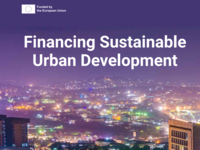
|
|
Financing Sustainable Urban Development
This report identifies relevant measures to help mobilise financing for urban development at all levels of government. Through urban case studies from different countries such as Senegal, Somaliland (Somalia), Uganda, Kenya and Malawi, as well as interviews with experts and practitioners, this report outlines why it is increasingly important to scale up investment from all sectors and sources in cities in developing countries. It also demonstrates the relevance of identifying concrete and actionable measures that could help alleviate constraints to mobilising finance for sustainable urban development. This working paper focuses on investment conditions and drivers, recognising the importance of flexibility for a wide variety of contexts. It fosters the support towards strengthening urban finance for liveable and equitable cities.
Author: Katharina Rochell, Dr. Xing-Quan Zhang, Lennart Fleck, Victoria Delbridge and Oliver Harman
Publisher: EU, UN-Habitat, International Growth Center
Publication Date: 2021
Copyright: EU, UN-Habitat, International Growth Center
|
| |
|
|
| |
|
|
|
|
|
2030 Agenda ● Localising the SDGs
|
|
|
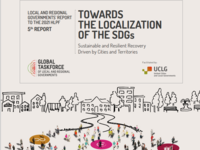
© Hkeita of iStockphoto / Ggraphic.com
|
|
Towards the Localisation of the SDGs: Sustainable and Resilient Recovery Driven by Cities and Territories
The fifth report of local and regional governments (LRGs) to the High-Level Political Forum provides readers with a comprehensive analysis of LRGs’ efforts to respond to the pandemic in cities and territories worldwide, as well as their connections with the SDGs under review. Focus is laid on the 43 countries presenting Voluntary National Reviews this year. It shows how LRGs are contributing to promoting a safe, just and green recovery at all levels and what challenges must be overcome to harness their full potential. Throughout six insightful chapters the policies and enabling environment for SDG localization are showcased as well as the effects of and recovery from the COVID-19 pandemic through concrete means of implementation are laid out.
Publisher: UCLG
Publication Date: 2021
Copyright: UCLG
|
| |
|
|
| |
|
|
|
|
|
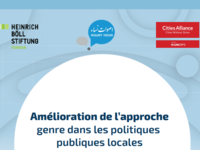
© Heinrich Böll Stiftung / Aswat Nissa / Cities Alliance
|
|
Gender Mainstreaming in Local Public Policies in Tunisia
These policy briefs fit into the greater framework of the "Improving the gender-mainstreaming within local public policies" project in the cities of Béja and Médenine. led by Aswat Nissa in partnership with Cities Alliance and Heinrich-Böll Stiftung. The aim of these brief is to contribute to reduce gender inequalities in a Tunisian context by decentralization of powers. The research is based on two field surveys that try to identify the gender needs of the population and assess the degree of gender mainstreaming in local policies. The policy briefs comprise recommendations to strengthen gender mainstreaming in the community planning process and thereby support the fight against all forms of discrimination and violence that vulnerable groups and especially women in the communities may face.
Publisher: Heinrich Böll Stiftung, Aswat Nissa, Cities Alliance
Publication Date: 2021
Copyright: Heinrich Böll Stiftung, Aswat Nissa, Cities Alliance
|
| |
|
|
| |
|
|
|
|
|
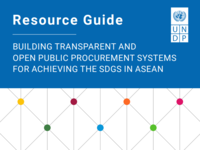
© UNDP
|
|
Resource Guide: Building Transparent and Open Public Procurement Systems for Achieving the SDGs in ASEAN
This resource guide by UNDP promotes collective action through multi-stakeholder partnerships where governments, citizen, and the private sector at all levels of government work together to strengthen transparency and openness in public procurement systems. Open and transparent public procurement systems are an important tool, not only in preventing corruption but also for achieving the SDGs, as they are a prerequisite for the delivery of basic services like medical goods, water services and infrastructure. This guidebook maps existing tools and best practices in the ASEAN region. Furthermore, it lays out some entry points for policy dialogue on this topic and reforms at the national and subnational levels.
Author: Magda Theodate
Publisher: UNDP
Publication Date: 2021
Copyright: UNDP
|
| |
|
|
| |
|
|
|
|
|
Urban and Territorial Governance
|
|
|
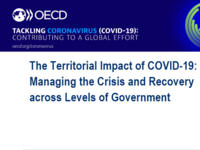
© OECD
|
|
The Territorial Impact of COVID-19: Managing the Crisis and Recovery Across Levels of Government
The COVID-19 pandemic required governments across the globe to address health, social, political and economic issues quickly and in a coordinated way. It also showed the need for coordinated, multi-sectoral and multi-level response to ensure addressing the crisis and recovery appropriately. While vaccinating the population is the main priority for governments, this also presents many challenges, especially for multi-level governance. Indeed, the effects of the pandemic are different across regions and cities. This paper analyses the different territorial dimensions of the pandemic's impact. It not only provides an overview of subnational responses to COVID-19 through the lenses of the health, economic, social and fiscal dimensions, it also offers a perspective on how the crisis can reshape multi-level governance.
Author: Dorothée Allain-Dupré, Isabelle Chatry, Antoine Kornprobst, Maria-Varinia Michalun, Courtenay Wheeler
Publisher: OECD
Publication Date: 2021
Copyright: OECD
|
| |
|
|
| |
|
|
|
|
|
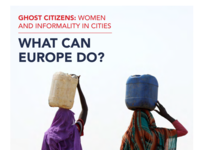
© UNOPS / Atsushi Shibuya
|
|
Ghost Citizens: Women and Informality in Cities - What Can Europe do?
Most people in the world live in informal settlements, work in the informal economy or have no identity documents. These people are especially vulnerable to crises and women represent a high number in this population. They are disproportionately affected by inadequate housing, services and infrastructure. Development action still insufficiently addresses the needs of women in informal contexts. The brief highlights the need for EU policymakers to implement the frameworks of the European Gender Strategy and the Gender Action Plan III effectively and enable inclusion in shaping future EU policies and action on giving legal recognition to people and specifically women, living in informal contexts. It provides thematic knowledge, recommendations for strategic and operational work and case studies on the topic.
Author: Giulia Maci, Felicity Kitchin
Publisher: Cities Alliance
Publication Date: 2021
Copyright: Cities Alliance
|
| |
|
|
| |
|
|
|
|
|
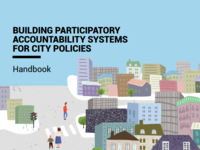
© UN-Habitat
|
|
Building Participatory Accountability Systems for City Policies
Rapid urbanisation is one of the main challenges of cities across the globe. Cities are trying to react rapidly and effectively to its impacts while acknowledging that inclusion is fundamental for resilient and sustainable development. Inclusion also means adapting to the context and finding suitable, tailored solutions for needs at the local level. Developed by UN-Habitat, this handbook is a guide for participatory approaches to urban projects. It presents a methodology designed and deployed in six cities in Bolivia, Brazil, and Peru from 2017 to 2020. The publication showcases how to strengthen participatory, transparent and accountable systems at the local level and introduces results, lessons learnt and innovative tools for capacity-building.
Author: Beatriz González Mendoza
Publisher: UN-Habitat
Publication Date: 2021
Copyright: UN-Habitat
|
| |
|
|
| |
|
|
|
|
| |

|
|
|
| |
|
|
| |
For access to even more inspiring publications on
1. DLG in Contexts of Fragility, Migration and Post-Conflict Settings,
2. Fiscal Decentralisation and Local Finance,
3. Localising the 2030 Agenda or
4. Urban and Territorial Governance
make sure to visit the regularly updated "Knowledge Section" of our DeLoG Website!
|
|
|


































